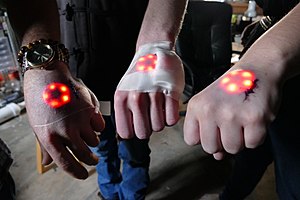This article has multiple issues. Please help improve it or discuss these issues on the talk page. (Learn how and when to remove these messages)
|
Grindhouse Wetware is an open source biotechnology startup company based in Pittsburgh, Pennsylvania. Grindhouse applies the biohacker ethic to create technology that augments human capabilities. The company is most well known for their Circadia device, a wireless biometric sensor that was implanted into co-founder Tim Cannon on the 22 October 2013.[1] Grindhouse has been featured in television shows such as Taboo on National Geographic Channel,[2] Joe Rogan Questions Everything on Syfy,[3] The Big Picture with Kal Penn,[4][5] as well as podcasts including Future Grind[6] and Roderick Russell's Remarkably Human.[7]
 Photos of Grindhouse Wetware's Northstar Device | |
| Industry | Biotechnology, Synthetic Biology |
|---|---|
| Founded | 2011 |
| Founders | Tim Cannon, Shawn Sarver |
| Headquarters | , U.S |
Key people | Ryan O'Shea (Spokesman) |
| Website | www |
In November 2015, Grindhouse members Tim Cannon, Shawn Sarver, Justin Worst, Jessica Waldrip, Michael Seeler, and Marlo Webber had prototypes of Grindhouse's Northstar device implanted into their hands during simultaneous procedures occurring at the "Cyborg Fair" in Düsseldorf, Germany, and at a studio in Pittsburgh. The implantation procedure was featured in an episode of the MTV documentary series True Life. Also featured in the episode was the public debut of the morse code functionality of Grindhouse's Bottlenose device at the first Pittsburgh Maker Faire.[8]
Projects
edit- Circadia is an implantable device that sends biometric data wirelessly via Bluetooth to a phone or tablet and is powered through inductive charging.[9] The first ever Circadia implant occurred in October 2013 in Essen, Germany, when body modification artist Steve Haworth implanted the device into Grindhouse co-founder Tim Cannon.[1]
- Northstar is a planned implant which will feature gesture recognition, can detect magnetic north, and mimics bioluminescence with subdermal LEDs.[10]
- Bottlenose is a wearable technology device that uses implanted or haptic magnets as data inputs to transmit information to the user through nerves.[11][12][13]
References
edit- ^ a b "The DIY Cyborg | VICE | United States". vice.com. Retrieved 2015-04-10.
- ^ "Inked, Pierced & Hooked | National Geographic Channel". Archived from the original on 2015-04-10. Retrieved 2015-04-10.
- ^ JRE Database (8 August 2013). "Joe Rogan Questions Everything - Episode 3 - Robosapien" – via YouTube.
- ^ "Episodic Photos | Foxflash". Archived from the original on 2015-05-18. Retrieved 2015-04-30.
- ^ "YouTube". YouTube.
- ^ "Ep. 1 – Tim Cannon on Biohacking and Transhumanism". futuregrind.org. Archived from the original on 2016-02-05. Retrieved 2015-10-23.
- ^ "Cyborg Next Door : Biohacking, Digital Implants & the Merging of Man & Machine". remarkablyhuman.com. 30 September 2014. Retrieved 2015-10-23.
- ^ "True Life season 2016, ep 6 I'm a cyborg". MTV. 24 December 2015. Archived from the original on January 4, 2016. Retrieved 2016-03-29.
- ^ "Move Over Wearables, Make Way for Invisibles". cisco.com. Retrieved 2015-04-10.
- ^ "Meet the grinders: The humans using tech to live forever". wareable.com. Retrieved 2015-04-10.
- ^ "What You Need to Know About Getting Magnetic Finger Implants". io9.com. 17 July 2013. Retrieved 2015-04-10.
- ^ "The brave new world of biohacking | Al Jazeera America". america.aljazeera.com. Retrieved 2015-04-10.
- ^ "Biohackers work toward building $6M man on do-it-yourself budget". triblive.com. Retrieved 2015-04-10.